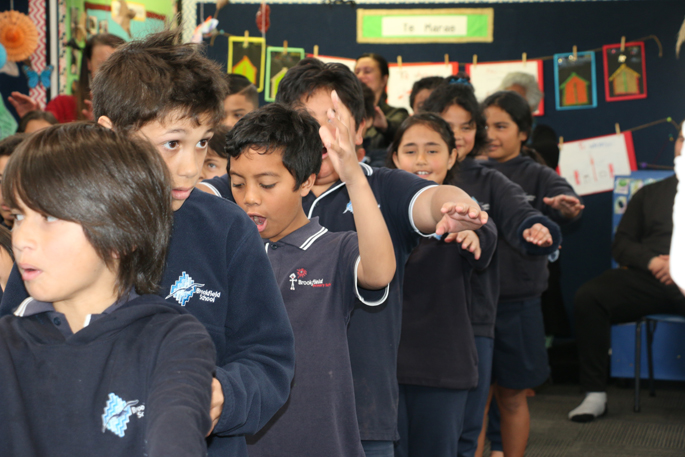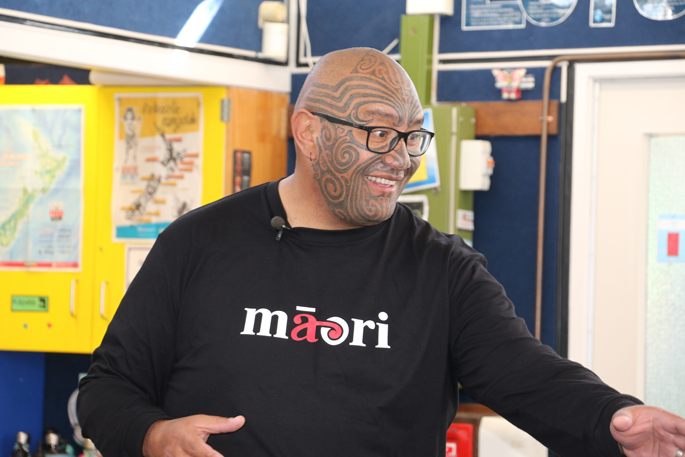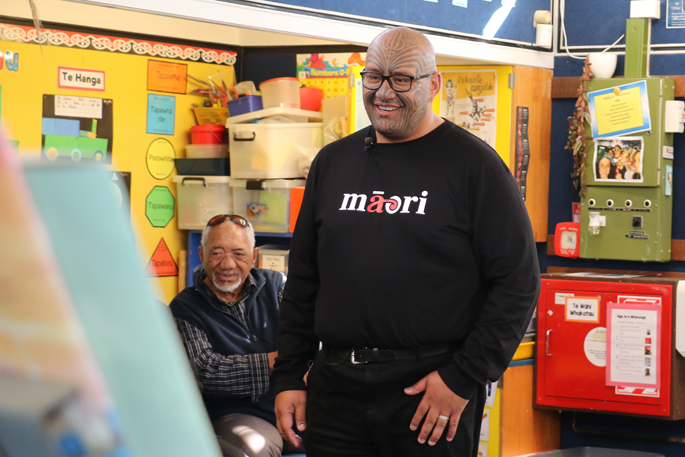The Māori Party has announced a raft of plans to help te reo Māori become further recognised as the indigenous language of Aotearoa.
To kick-start Māori Language Week, Waiariki candidate Rawiri Waititi announced the party's te reo Māori policy this morning at Brookfield School in Tauranga.
The policy sets out to ensure New Zealand's name is changed to Aotearoa and that all Pākeha place names, cities and towns will be replaced with their original ingoa Māori by 2026.
Waititi says the bold move will help elevate te reo Māori to its rightful place, in a system that has 'long undervalued its significance”.
"It is time that our children know they are growing up in Aotearoa, which is a pacific nation. It is not a European nation," says Waititi.
"We want to change Towel-wronger back to Tauranga. You also have places like Hamilton – Kirikiriroa and Gisbourne – Tūranganui-a-Kiwa.”
He addressed a packed-out classroom of students and teachers, speaking about how colonisation has resulted in a steady decline of te reo Māori in Aotearoa.
'Our elders were punished – they were whacked with a strap – for speaking Māori at school, for speaking Māori in the playground.
'That's the reason why there has been a huge decline in our te reo Māori. So we are working really, really hard to ensure that te reo Māori is taken to its rightful place as the indigenous language in this country.”
 Brookfield School students singing waiata at the policy announcement. Photo: Dan Campbell.
Brookfield School students singing waiata at the policy announcement. Photo: Dan Campbell.
The policy would require all primary schools to incorporate te reo Māori into 25 per cent of their curriculum by 2026 and 50 per cent by 2030.
He says it is unacceptable that only 20 per cent of Māori can converse in te reo Māori, which equates to three per cent of the population.
'It's a bold move but we must put a pou in the ground.
'We are in a sad state of affairs. We want this to be a living language not just for Māori kids, or Māori people – but for all of Aotearoa.”
The policy would also see te reo Māori and Māori history become core curriculum subjects up to Year 10 at secondary schools across the country.
Waititi says it's important that te reo Māori and Māori history are core curriculum subjects.
 The policy has been described as a bold move to help ensure that te reo Māori is taken to its 'rightful place” as the indigenous language in New Zealand. Photo: Dan Campbell.
The policy has been described as a bold move to help ensure that te reo Māori is taken to its 'rightful place” as the indigenous language in New Zealand. Photo: Dan Campbell.
'If you know the history of Aotearoa, then you know the struggles that our people have had to face over many years.
'If people understand that, then they are more sympathetic and empathetic to what we have to do in trying to revive the language and to revitalise the culture.”
The party would invest $50m into the establishment of a Māori Standards Authority.
The independent statutory entity will audit all public service departments against cultural competency standards, including the monitoring and auditing of language plans.
State-funded broadcasters would also be required to have a basic fluency level of the language.
'It is absolutely unacceptable for broadcasters in mainstream media to be butchering te reo Māori.
"No more will we be listening to the news or the radio where people are murdering our language and murdering the pronunciation."
Waititi says the Māori Language Week would be extended by three weeks, becoming Te Marama o te Reo Māori.
'We are going to claim another three weeks. Like the incoming tide, we are just going to take things back gradually because we are kind.”
The full policy:
- Change New Zealand's name to Aotearoa by 2026.
- Replace all Pākeha place names, cities and towns to their orignal Māori ingoa by 2026.
- Invest $50m into the establishment of a Māori Standards Authority; an independent statutory entity whose role will be to audit all public service departments against cultural competency standards, including the monitoring and auditing of lanugae plans.
- Establish Te Marama o te Reo Māori.
- Double Te Mātāwai funding ($28m).
- Remunerate Primary and Secondary schools and kaiako based on their competency of Te Reo Māori.
- Ensure that Te Reo Māori and Māori History are core cirriculum subjects up to Year-10 at Secondary Schools.
- Invest $40M for early childhood to secondary school kaiako to develop their reo.
- Require all primary schools to incorpoate Te Reo Māori into 25% of their curriculum by 2026 and 50% by 2030.
- Invest $20m into the development of Te Reo Māori resources.
- Require all state funded broadcasters (workforce) across all mediums to have a basic fluency level of Te Reo Māori.



0 comments
Leave a Comment
You must be logged in to make a comment.